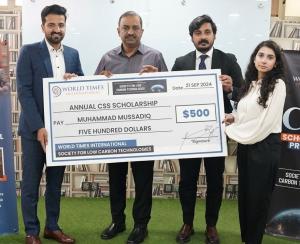
Smog Diplomacy: The Organization Leading the Charge to Address Pakistan's Air Pollution Crisis

In Lahore, Pakistan, the SFLCT’s Greater Middle East Chair, Osama Rizvi, and Board Chairman, Fernando C. Hernandez, concluded their foretelling videocast in early 2024
LAHORE, PAKISTAN, December 18, 2024 /EINPresswire.com/ -- Pakistan's Punjab province recently declared a health emergency due to historic pollution levels, forcing the closure of schools and sparking urgency to construct mobile clinics to treat respiratory problems. However, in early 2024, the Society for Low Carbon Technologies (SFLCT) initiated smog diplomacy by executing the nation's first low-carbon agreement in Lahore, Pakistan, as a preemptive counterbalance to this current crisis. This came via the organization's Chairman of the Board, Fernando C. Hernandez, and Greater Middle East Chair, Osama Rizvi, who have directly experienced Pakistan's air quality challenges and were aware of the impending consequences.
Additionally, Hernandez and Rizvi proposed proactive smog remedies in March, which were highlighted by the insights shared in the World Times Institute (WTI) videocast recording aptly titled "Pakistan, Climate Change, Smog, and Its Solutions." Rizvi continued the momentum, representing the SFLCT at the 29th Conference of the Parties (COP29) in Baku, Azerbaijan, in November. And he met with the World Bank and other key players, generating pragmatic discussions about leveraging additional smog solutions in Pakistan.
Rizvi's meeting with the World Bank at COP29 shed light on the detrimental effects of smog on Mexico City and Beijing, along with the observed progress in its mitigation. Interestingly, Hernandez has firsthand experience from the 1980s in Mexico City's smog, which he categorically mentioned in the WTI recording of how it affected him and his family. He also included remedies from that period, showcasing the SFLCT's generational foresight and experience.
Hernandez notes that, “We did not expect our preemptive smog solutions to be so urgently needed in 2024, emphasizing the need of the SFLCT's Pakistani low-carbon push for change." He makes this statement in reference to the previously mentioned videocast, which details the importance of increasing geothermal, renewables, direct air capture, and a variety of sustainable technologies. Rizvi adds, “These technological solutions will certainly take time, but what is equally certain is that we have created a regional catalyst for a cleaner Pakistan.”
For context, it is key to note that the SFLCT, led by Hernandez and Rizvi, and the WTI's international arm, led by Adeel Niaz and Wania Nabeel (they are pictured in the scholarship image), spearheaded the execution of Pakistan's first low-carbon agreement. This, in turn, saw the donation of scholarship funds to Muhammad Mussadiq to further promote sustainable energy, low-carbon education, empower change agents, and spark knowledge sharing on combatting smog.
This agreement is in line with Hernandez's experience in advancing the SFLCT’s efforts in global low-carbon diplomacy, which includes successfully implementing legislation, furthering collaboration among nations, and executing other agreements that catalyze low-carbon practices and technologies. The smog diplomats unwaveringly advocate for environmental legislation and incentives in the South Asian nation, as demonstrated in the videocast, while outlining the SFLCT's deep expertise with key low-carbon players and technologies. This is why Hernandez discusses his connection with Mission Zero Technologies' CEO, Nick Chadwick, regarding the company's pioneering development of the U.K.'s first DAC system and its critical relevance to Pakistan, given the country's high CO2 levels. Rizvi details how the SFLCT's global network can strengthen Pakistan’s resilience through international partnerships.
Today, the pair continue to call for economic development to create a low-carbon workforce by upskilling and empowering society with actionable knowledge. They argue that addressing the smog crisis requires not only immediate interventions but also long-term strategies focused on sustainable urban planning and public awareness campaigns highlighting low-carbon and prudent energy utilization. Their ongoing efforts aim to mobilize stakeholders across global sectors for actionable remedies, ensuring a healthier environment for Pakistan's current and future generations and for the biosphere's betterment.
Press Relations
Society for Low Carbon Technologies
email us here
Distribution channels: Energy Industry, Environment, Science, Technology, World & Regional
Legal Disclaimer:
EIN Presswire provides this news content "as is" without warranty of any kind. We do not accept any responsibility or liability for the accuracy, content, images, videos, licenses, completeness, legality, or reliability of the information contained in this article. If you have any complaints or copyright issues related to this article, kindly contact the author above.
Submit your press release
